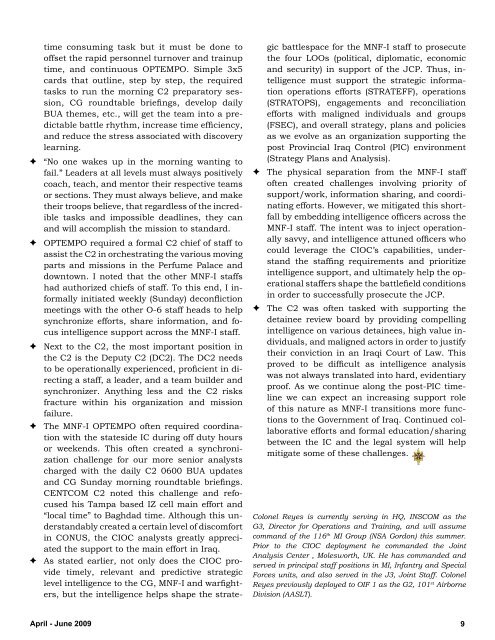Military Intelligence Professional Bulletin - Federation of American ...
Military Intelligence Professional Bulletin - Federation of American ...
Military Intelligence Professional Bulletin - Federation of American ...
You also want an ePaper? Increase the reach of your titles
YUMPU automatically turns print PDFs into web optimized ePapers that Google loves.
Ê<br />
Ê<br />
Ê<br />
Ê<br />
Ê<br />
time consuming task but it must be done to<br />
<strong>of</strong>fset the rapid personnel turnover and trainup<br />
time, and continuous OPTEMPO. Simple 3x5<br />
cards that outline, step by step, the required<br />
tasks to run the morning C2 preparatory session,<br />
CG roundtable briefings, develop daily<br />
BUA themes, etc., will get the team into a predictable<br />
battle rhythm, increase time efficiency,<br />
and reduce the stress associated with discovery<br />
learning.<br />
“No one wakes up in the morning wanting to<br />
fail.” Leaders at all levels must always positively<br />
coach, teach, and mentor their respective teams<br />
or sections. They must always believe, and make<br />
their troops believe, that regardless <strong>of</strong> the incredible<br />
tasks and impossible deadlines, they can<br />
and will accomplish the mission to standard.<br />
OPTEMPO required a formal C2 chief <strong>of</strong> staff to<br />
assist the C2 in orchestrating the various moving<br />
parts and missions in the Perfume Palace and<br />
downtown. I noted that the other MNF-I staffs<br />
had authorized chiefs <strong>of</strong> staff. To this end, I informally<br />
initiated weekly (Sunday) deconfliction<br />
meetings with the other O-6 staff heads to help<br />
synchronize efforts, share information, and focus<br />
intelligence support across the MNF-I staff.<br />
Next to the C2, the most important position in<br />
the C2 is the Deputy C2 (DC2). The DC2 needs<br />
to be operationally experienced, pr<strong>of</strong>icient in directing<br />
a staff, a leader, and a team builder and<br />
synchronizer. Anything less and the C2 risks<br />
fracture within his organization and mission<br />
failure.<br />
The MNF-I OPTEMPO <strong>of</strong>ten required coordination<br />
with the stateside IC during <strong>of</strong>f duty hours<br />
or weekends. This <strong>of</strong>ten created a synchronization<br />
challenge for our more senior analysts<br />
charged with the daily C2 0600 BUA updates<br />
and CG Sunday morning roundtable briefings.<br />
CENTCOM C2 noted this challenge and refocused<br />
his Tampa based IZ cell main effort and<br />
“local time” to Baghdad time. Although this understandably<br />
created a certain level <strong>of</strong> discomfort<br />
in CONUS, the CIOC analysts greatly appreciated<br />
the support to the main effort in Iraq.<br />
As stated earlier, not only does the CIOC provide<br />
timely, relevant and predictive strategic<br />
level intelligence to the CG, MNF-I and warfighters,<br />
but the intelligence helps shape the strate-<br />
gic battlespace for the MNF-I staff to prosecute<br />
the four LOOs (political, diplomatic, economic<br />
and security) in support <strong>of</strong> the JCP. Thus, intelligence<br />
must support the strategic information<br />
operations efforts (STRATEFF), operations<br />
(STRATOPS), engagements and reconciliation<br />
efforts with maligned individuals and groups<br />
(FSEC), and overall strategy, plans and policies<br />
as we evolve as an organization supporting the<br />
post Provincial Iraq Control (PIC) environment<br />
(Strategy Plans and Analysis).<br />
The physical separation from the MNF-I staff<br />
<strong>of</strong>ten created challenges involving priority <strong>of</strong><br />
support/work, information sharing, and coordinating<br />
efforts. However, we mitigated this shortfall<br />
by embedding intelligence <strong>of</strong>ficers across the<br />
MNF-I staff. The intent was to inject operationally<br />
savvy, and intelligence attuned <strong>of</strong>ficers who<br />
could leverage the CIOC’s capabilities, understand<br />
the staffing requirements and prioritize<br />
intelligence support, and ultimately help the operational<br />
staffers shape the battlefield conditions<br />
in order to successfully prosecute the JCP.<br />
The C2 was <strong>of</strong>ten tasked with supporting the<br />
detainee review board by providing compelling<br />
intelligence on various detainees, high value individuals,<br />
and maligned actors in order to justify<br />
their conviction in an Iraqi Court <strong>of</strong> Law. This<br />
proved to be difficult as intelligence analysis<br />
was not always translated into hard, evidentiary<br />
pro<strong>of</strong>. As we continue along the post-PIC timeline<br />
we can expect an increasing support role<br />
<strong>of</strong> this nature as MNF-I transitions more functions<br />
to the Government <strong>of</strong> Iraq. Continued collaborative<br />
efforts and formal education/sharing<br />
between the IC and the legal system will help<br />
mitigate some <strong>of</strong> these challenges.<br />
April - June 2009 9<br />
Ê<br />
Ê<br />
Colonel Reyes is currently serving in HQ, INSCOM as the<br />
G3, Director for Operations and Training, and will assume<br />
command <strong>of</strong> the 116 th MI Group (NSA Gordon) this summer.<br />
Prior to the CIOC deployment he commanded the Joint<br />
Analysis Center , Molesworth, UK. He has commanded and<br />
served in principal staff positions in MI, Infantry and Special<br />
Forces units, and also served in the J3, Joint Staff. Colonel<br />
Reyes previously deployed to OIF 1 as the G2, 101 st Airborne<br />
Division (AASLT).
















